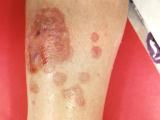Oct 4, 2012 (CIDRAP News) – An outbreak of fungal meningitis linked to spinal steroid injections for back pain has increased to 35 cases with six deaths, and healthcare providers are being urged to contact all patients who might have received the injections, federal health officials said today.
New England Compounding Center (NECC) in Framingham, Mass., has suspended its operations and recalled all methylprednisolone acetate and other products intended for intrathecal administration as the investigation continues, Ilisa Bernstein, PharmD, JD, of the US Food and Drug Administration (FDA) said at a press conference this afternoon.
"FDA has detected fungal contamination by microscopic examination of material from a sealed vial of methylprednisolone acetate from NECC," said Bernstein, who directs the Office of Compliance in the FDA's Center for Drug Evaluation and Research.
Benjamin Park, MD, of the Centers for Disease Control and Prevention (CDC), said concern focuses on three lots of preservative-free methylprednisolone acetate that were produced by NECC since July and were recalled on Sep 25. He recommended that healthcare providers contact all patients who received injections from those lots to see if they are having any new or worsening symptoms. If they are, they should be evaluated immediately, he said.
Park, a mycotic disease expert in the CDC's National Center for Emerging and Zoonotic Infectious Diseases, also recommended that hospitals and clinics remove all NECC products from their inventories.
The 35 meningitis cases identified so far include 25 in Tennessee, one in North Carolina, two in Florida, four in Virginia, two in Maryland, and one in Indiana, Park reported. He said there have been three deaths in Tennessee, one in Virginia, and one in Maryland.
The new numbers mark an increase of nine cases and one death since yesterday.
Park said methylprednisolone acetate from the three NECC lots was distributed to up to 75 medical facilities in 23 states, which he named: California, Connecticut, Florida, Georgia, Idaho, Illinois, Indiana, Maryland, Michigan, Minnesota, North Carolina, New Hampshire, New Jersey, Nevada, New York, Ohio, Pennsylvania, Rhode Island, South Carolina, Tennessee, Virginia, Texas, and West Virginia.
Bernstein said FDA inspectors at NECC found "foreign material" in vials of some products other than methylprednisolone acetate, but the material has not yet been identified.
The illnesses identified so far have occurred only in patients who received epidural steroid injections of methylprednisolone acetate from one of the three lots, Park said.
He and Bernstein said they don't know yet how many vials of the product may be involved or how many patients might have received the injections.
The CDC is working with state health departments to learn which facilities received the recalled products, and facilities are contacting patients, Park said. He added that patients who recently received spinal steroid injections and are concerned should contact their provider to find out what product was involved, Park said.
Yesterday, Tennessee health officials said two meningitis patients had infections consistent with Aspergillus, but officials at today's briefing didn't cite a particular fungal species.
"Currently we think this type of meningitis is quite severe, and the antifungal treatment for this is intravenous, so it requires at least initial hospitalization," Park said. He said the treatment could be prolonged, "potentially on the order of months."
"Hopefully we can identify patients early, because we think early antifungal treatment can improve the outcome," he said.
Park said fungal meningitis is very rare and tends to occur in people who are "profoundly immunocompromised."
See also:
Oct 3 CIDRAP News item about the outbreak
Transcript of Oct 4 CDC-FDA press briefing




















